Game B
I tend to operate on the premise that the longer it takes to determine intent, the higher the probability you deal with subversive marxists. And Game B appears to be no exception.
So let’s go through what little information they have divulged and establish exactly why their Utopian Techno-Socialism definitely is not in your best interest.
A while back, I went on a 3-day Marxists.org binge. Not because I align politically, but as a result of a deep dive through 1910s Hollywood, back when the communist infiltration began. And… it was illuminating, if for one primary reason. At no stage do they ever tell you what their genuine intent is, no, they focus most of their efforts on a strong, targeted societal critique of contemporary society, while painting some absurd fantasy awaiting should you sign away all your rights to this ‘temporary’ dictatorship ‘of the proletariat’. Well, often they don’t even tell you about that, but rather all the lollipops and unicorns awaiting should you follow their siren song.
Once elected, of course, the outcome tends to somewhat deviate from promises, but by then it’s far too late for you to object. In other words - the primary weapon of communists is their insane capability of telling unbridled lies in the most incredibly subversive way possible, delivered by pathologically lying clinical psychopaths. One such example - though not claimed to be aligned - is the Fabian Society, who of course will object to this description, while neglecting to tell you about their champagne socialist background and ethical socialism.
The Fabians in fact were historically aligned with eugenic1 ideology2… but that’s just one of those things you’re not supposed to talk about.
Either way, I’d seen ‘Game B’ referred to here and there, but it appeared yet another of these… opaque, bland terms which just… sort of flies under the radar on account of its title alone. But a whole string of high profile intellectuals are associated - some of whom were not household names when this began (notably Jordan B Peterson and Bret Weinstein), so that prompts the question - what the hell is it actually about?
And while they have a wiki page3, this is chock full of the sort of vague, empty rhetoric you’re likely to see in the introduction to cults and quasi-religions. And already the very first ‘construction’ leaves… a somewhat incomplete picture -
‘Game B is the flag on the hill for an omni-win civilization that maximizes human flourishing‘
What on Earth is that even supposed to mean? Is this genuinely supposed to convince, or is it a subversive way to appeal to those spending too much time playing computer games And though we could go through each and every one of those ‘constructions’, I see no genuine need to, because they all represent lofty goals and aspirations, without any level of specificity whatsoever, such as -
‘Game B is the infinite game where the purpose is to continue playing. Game A is the finite game where the purpose is to win‘
… ok, but how? Helpfully, it carries on by including a description of ‘what Game B is not’… which then brings us back to Marx, and his incessant societal critique without offering any genuine alternatives -
‘It is not an apocalyptic view of the world; actually, the world in all its manifestations of cultures and extremes is remarkably plastic, resilient and adaptable‘
Which gives a flash of insight to which we will return later… though that predictably is followed by -
‘It is not a utopia in the making, nor a movement aimed at replacing markets and money with some obscure technology-driven new social order‘
… which I’m pretty sure is a straight up lie.
Next follows… by far the more comprehensive part of the page - the… partial and somewhat selective history, making somewhat odds claims about scarcity relating to agriculture (while completely ignoring not only similar issues prior to the invention of agriculture, but also that said agriculture in fact led to an increase in food - both exclusions which appear grossly dishonest in my book) - ultimately to finish off on a somewhat Malthusian note.
We are then treated to yet another hugely selective and self-serving outline of the alleged ‘crisis caused by Game A’, broadly summarised as ‘Game A bad, mmkay’. It’s just such a weird, cherry picked argument - especially in light of included stats earlier not exactly proving that case. And this case of… extraordinarily biased arguments and severely one-sided, flawed ‘science’ carries on. This section essentially serves as the critique of contemporary society - after which we of course will be treated to the solution, right?
… well, not exactly. The ‘solution’ starts off by listing the same terrible ‘constructions’ and ‘definitions of what Game B is not’ witnessed early on, and is then followed by buzzword bingo and a long list of meaningless non-solutions, such as ‘prototyping new models, building necessary infrastructure, taking well-considered and intentionally evolving swings at chunks of the larger problem‘, ‘Consciously and carefully co-creating an emergent and scalable new game‘, and ‘eschew reductionism, prescription and strategizing, and instead embrace complexity, uncertainty, and emergence‘. It’s complete and utter baffle-them-with-bullshit territory, hoping your mind will fill in the gaps as they have quite literally nothing. No, they really do have nothing, and they state so themselves -
‘Note that there are no plans or strategies to get to Game B because it is hard to plan for emergence. As a collective, each of us discerns with our full self the best "next action" and the "adjacent possible" and moves in that direction‘
Ie, the solution is… for you to work out.
‘Game B, as an operating group, fell apart over two directions: personal change vs. institutional change‘
And that is an interesting inclusion. But rather than waste more time on this epic trash, let’s instead wrap this part up by pointing out the inclusion of Ken Wilber’s AQAL (Integral Theory), which isn’t that strange given his involvement.
The Stoa is one of the sites associated with ‘Game B’, and the administrator of said, Peter Limberg, a few years back released a ‘Stoa Game Plan’4, which since my last visit a few weeks ago has gone behind a paywall. And, though I don’t seek to make a big deal out of it, this plan is one which resonates rather strongly with ones I witnessed during my Marxists.org binge, as the focus relates to ‘seducing the artists and intellectuals’, before eventually setting sights on ‘the normies’. And this serves an… interesting parallel. But it’s not terribly important, thus I can’t be bothered with proper sourcing - so here’s ChatGPT’s verdict instead -
But it isn’t the only similar such… hint… because here’s Cadell Last - in own words - during a discussion with Jim Rutt declaring the similarity in metaphysical structure, comparing Game B to outright communism5. His words, not mine.
The Game B wiki conveniently includes a list of contributors6, and beyond those of high visibility - Bret Weinstein, Eric Weinstein, Ken Wilber, and Jordan B Peterson - we see the inclusion of (from above) Jim Rutt, Cadell Last and Peter Limberg, and further Alexander Bard, Daniel Schmachtenberger, Bruce Alderman, Forrest Landry, John Vervaeke, Jordan Hall, Tyson Yunkaporta, and Zachery Stein. And though others are involved, the primary material I’ve been able to locate centres around these individuals.
Jim Rutt appears their illustrious leader, and his past includes a chairmanship of the Santa Fe Institute7, former CEO of Network Solutions… it’s an all-round impressive CV, but he further lists Executive Producer of the film ‘An Initiation to Game~B’, which would thus appear an excellent place to start.
And the film starts off… just a tad on the cult-like side8, insisting that ‘the game we’ve played up until this stage constitutes a parasite’. It’s a somewhat subversive societal critique, not unlike material I’d expect to find in context of marxist indoctrination.
It continues by explaining that our current game - Game A - was a later version of the original game - The First Game - which was ‘our most enduring and successful game’, as this game focused on the ‘cycle of regeneration’. And though it would be easy to comment on this in terms of life quality, hardship, average lifespan and so forth, let’s instead focus on where they’re going with this (apart from the obvious ‘degrowth’).
It outlines a Neoplatonistic/Great Chain of Being-like structure, with a Monarch (the one; purposive), the sage (nous; normative), the chief (soul; pragmatic), and… well… you, the sucker who as the new member will enter the hierarchy at the bottom level (matter; empirical) of the ‘human super-organism’. They even helpfully add a pyramid - though claiming this relates only to ‘Game A’, and definitely not ‘Game B’… in spite of only just outlining exactly a such hierarchy… either way, they finish off by stating that although ‘Game B is not yet been invented, nor guaranteed’, it’s ‘potential is real’ - leading us right back to the empty promises of Utopian Socialism.
The movie ends by ‘educating’ us about all the alleged crisis - ecological, political, social and educational - stating that we must rush headlong into this utopian solition which is ‘neither written nor guaranteed’ using a ‘bioregional mesh network’, before finishing off with my personal favourite cinematic moment in contemporary movie history - the end of this crass, subversive trash, telling us to ‘find the others’.
And that reference… rests uneasily with me, because it’s squarely in line with Emmanuel Levinas. So off to their website we go9, where we find not only another reference to ‘the others’ along with a call for us to ‘create a new social operating system‘, but also a quote by Ilya Progogine, a familiar name in the context of General Systems Theory. As for the website itself, that goes on to state that this relates to -
‘… a transcontextual inquiry into a new social operating system for humanity. Game A is what got us to this time of metacrisis and collapse. Game B is what emerges in response‘.
… a new Social Operating System to solve our alleged meta-crisis, which should be adaptive, resilient, self-organising and drags in a noted systems thinker… and all in context of ‘the others’?
There are so many alarm bells going off here at the same time.
But back to Jim Rutt, as he’s contributed to a large number of YouTube videos, with this first one titled ‘Protyping a Global Social Operating System’10, featuring somewhat telling inclusions such as -
‘… what we really think about in terms of a target is a way of life for everybody on earth that’s approximately similar in terms of its burden on the earth…‘
… yet another phrase, suggestive of Marxist ideology, and -
‘… to consider humanity as a whole is really a hard step and whether that’s the job for education or whether that’s the job for morality for values and virtues… those things must be cooked into game b as our virtues, our values and out norms, and so i think our ethical system is kind of a hybrid between ethics and utilitarian ethics…‘
… as is the ‘human super-organism’, and to this extent, either the education system or the ‘system of morality’ should be used to facilitate this line of thinking. And finally -
‘… we had Forest Landry on the show a few months and we discussed with him how ethics is integral to a complexity understanding of our reality‘
… it’s all about Ethics. Global Governance through Global Ethics.
But the clip really is something else, because he also through -
‘One thing we talk about often is that Game A, due to its nature of command, control, and power, has no filtering mechanisms for leadership‘
Yes, it does. It’s called an election. But intent here of course if for them to vet potential candidates before they’re even allowed to run, in contemporary terms called ‘democratic legitimacy’ (as determined by them). Also -
‘… Game B could lead to a worse nightmare than Game A…‘
… how can anyone believe a word beyond that? He is outright telling you that Game B has the potential of leading to totalitarianism. Especially considering -
‘How do we create a system that protects the integrity of Game B?‘
… they want absolutely no oversight carried out by those uninvited. Do not trust them.
The inclusion of Forrest Landry is noteworthy, but the related clip is absolutely tedious11, really is. In fact, you have to skip to around the 50 minute mark before we see the remarkable conclusion that -
‘While we may not yet have anything resembling a solution, I feel that we have the foundation to move forward‘
… and never mind that Jim Rutt stated this might lead to authoritarianism, but -
‘Personally, I focus on ethics as the compass. Ethics provid direction and motivation…‘
It’s about Ethics. Ethics, Ethics, Ethics.
He carries on -
‘… emphasises the ethical dimension within complex system… we must all act as ethical agents. This recognition of embeddedness in the system underscores the responsibility we all bear‘
… ethics, with a dash of responsibilities, because -
‘Science tells us what we can do, but it doesn’t tell us what we should do‘
… but add an ‘ethics declaration’ followed by an enforcement mechanism, and suddenly all those covid doctors quite simply carry out orders.
Directive Ethics.
Anther central character is Jordan Hall, and he’s also contributed to rather a lot of these Game B discussions. At the 1:13 mark of the ‘Game B Dialogos’12, they gravitate towards the discussion of the use of violence in their productions, but this eventually becomes (1:14:39) -
‘The people defending and protecting Game A are going to fight, so there’s going to be violence, there’s going to be confrontation. That’s the reason we would fight. The curious thing about this whole concept is that it contains everything.‘
And, you know, under normal circumstances I wouldn’t care much, but we live in times where the contemporary left is happy to grossly misinterpret everything for political expedience, and see no trouble in throwing people under the bus for sakes of virtue, provided they’re not politically aligned. And I realise the obvious excuse will centre around this relating to their productions, but still… this is somehow acceptable? Given the circumstances, I find it remarkably hypocritical. And Jordan Hall follows, by stating -
‘… people asked the question earlier about things like logic, and is logic part of this game b violence? Of course the answer is yes…‘
… the danger, of course, is that someone out there just might take this seriously and start shooting at a presidential candidate. It just comes across, best case, as… bad taste and somewhat misguided. In fact, it comes across a little like… agitprop.
Daniel Schmachtenberger adds to this, speaking of ‘consciously directing that thing’, where said relates to the ‘superstructure’ which should be put in the best light of ‘the beautiful’ and the ‘ordinating values’ - which again takes us back to Neoplatonism and the ‘human super-organism’.
As for agitprop, Jordan Hall later speaks to the extent of ‘pissing people off isn’t necessarily a bad thing’, before Jeff Gomez discusses the concept of ‘systemic change’ subversively being injected into Disney productions. All of this… really does come across really rather similar to Marxist strategies of the past.
But Jordan Hall’s comments in the clip ‘Building a Better Civilization with Tech Pioneer Jordan Hall’ are somewhat more… poignant. At 1:15:30 he remarks (and I quote this in full, because otherwise someone would claim it’s ‘missing context’) -
‘Do you care for your body well? Like consider the whole and all the nested wholeness as a primary evaluation of where you're going to orient choice-making responsibility. And by the way, choice making responsibility, we don't have the principle of free speech is absurd. There's the responsibility of free speech, right? There are no freedoms. There are only responsibilities and they have to be held in perfect symmetry, right? You're given the ability to do something because you're carrying it heavily into the world. This is the game being move again, is the reintegration of an arbitrarily diversifying singularity into a wholeness is, you're carrying your particular cross, it's a cross, and it's not your sort of snowflake specialness.’
Got it? You don’t have a right to free speech, but only a responsibility thereof. And this responsibility needs balancing, relative to your wholeness, ie, your acceptance of…
‘The atomized individual is in fact not an individual at all. It's a non-existence. It's that game A formal. It's a formalism. An actual human is more singular, more the essence of who they are, precisely by the degree to which they are able to fully be in relationship with a larger and larger content.‘
… being a cell within the ‘human super-organism’. And this entire argument is entirely aligned with Marc Gafni’s concept of ‘Unique Self’.
The entire clip is illuminating, with plenty of references to systems thinking in context of complexity and resilience, and it further goes on to state that -
‘complexity, if anything, is anti-fragile; maximizing it has no inherent temporal limit and no internal contradictions that would make it collapse over time’.
These could all be considered bold claims. But should we consider all of these from a hierarchical systems view, it makes sense… but only if you either have absolutely no grasp of reality, or you intentionally try to deceive.
[45:03] ‘… a lot of this, you're going to start getting a degradation, an increase in the entropy of your operating environment, which then will lead to a, what's that called, procession in the stability of your cybernetic control system, which remember is complicated. It's fragile.’
… then goes on to attempt to rebrand ‘complexity’ as ‘complicatedness’ -
[45:17] ’And I should say, by the way, I'm, by the way, I'm now I'm using sort of Tainter and Quigley to describe it. There's a lot of different, really good theoretic structures that we use to build out the Game A diagnosis. Joseph Tainter and Carol Quigley, the quickly evolution of civilizations and tainter the collapse of, he calls them complex societies, but I would say complicated is what he's talking about.’
Ie, his issue with the word ‘complex’ as used by Tainter is that he prefers to associate ‘complex’ with systems thinking, which is also convenient from the perspective of his mention of cybernetics. Consequently - as outlined above - his argument rests upon a definition of hierarchical systems theory. And he then adds -
[45:44] ’Complexity is not finite in its epistemological character. Complicatedness is. It is strictly therefore less than. So I cannot use a complicated control system to control a complex environment because I have a basic cybernetics control system must have at least as much information as the system is trying to control.‘
… not only that hierarchical systems theory - Skeleton of Science - can be used to control Tainter’s definition of Complexity (the legit one), but furthermore adds an indirect call for the informational theory component as well - ie, surveillance.
The guy really is remarkably deceitful in so many ways, but for him to drag in Joseph Tainter, whose ‘Collapse of Complex Societies’13 is one of the best books I’ve read, is not only bold, but flat-out wrong, because that book states that societies collapse because the marginal return on investment goes negative. Tainter thus presents an economic argument, whereas Hall uses it as an argument relating to systems theory control of a ‘complicated’ system. Hall’s argument - at best - is a gross misrepresentation.
But the more you carry on through the clip - and I had ChatGPT clean up the countless ‘um’, ‘er’ and repetitions in the YouTube clip, and marginally shine up the language - the more… interesting inclusions you’ll come across. First he speaks of the requirement of ‘reconditioning of behaviour’ (strictly authoritarian), he then speaks of us ‘fine-tuning our existing capabilities’ (per whose standards?), and then make a curious addition of ‘act wisely, make better choices, and iterate’.
And you should now realise that his premise above of ‘no internal contradictions that would make it collapse over time‘ is… somewhat flawed, because it assumes perfect knowledge and a deterministic world thus requiring no iteration. But to hammer it home -
‘To move toward Game B, individuals should aim to become "Game B beings" themselves, starting in psychology by freeing themselves from a "complicated mind" and returning to a natural "complex mind."‘
He above redefined ‘complexity’ to revolve around systems thinking, and he now asks you to - in short - turn your ‘complicated mind’ over to ‘a complex mind’ which to him is systems thinking, and thus logically artificial intelligence.
And we could continue through the discussion of ‘collective insights’ and ‘hyper-conversions’ which straddle the dimension of time, essentially aligning with noted systems designer Ervin Laszlo’s Akashic Field theory - but I honestly fail to see the point. His motivation here is really, really clear.
Jordan Hall, in short, is the ‘tech guru’ of the Game B team, and he tells you of a future, controlled by AI (Digital Twins) through adaptive management.
But before we leave this clip, there’s one, final, major inclusion which cannot go ignored, because not only is it entirely centric to this giant synthesis of mine which I have progressively developed over the past 18 months, but it’s also an excellent display of the lengths to which they go to hide information in plain sight - through endless, opaque phrasing, repeatedly circumventing the core issue. This starts around the [1:39:36] mark, with first a direct quote -
‘Al is Moloch, right? It is at its essence, it is a finite state machine, a very large capacity that has its primary characteristics separating complexity into complicatedness.‘
AI… is a system of very large computational complexity, which can be used to impose order on nature’s ‘analogue’ chaos. And humanity, as part of that nature, will be managed through that same system as well.
But in order for to this to be trustworthy, said AI needs a set of guiding principle or an ethical approach - an ‘anti-Moloch’ - ensuring AI serves humanity.
And that is what is otherwise known as ‘AI Ethics’14.
Consequently, Jordan Hall’s argument is a call for nature’s complexity - including humanity - to be managed by Artificial Intelligence, controlled through AI Ethics.
But should you sit with this feeling that Jordan, ultimately, is simply ‘misunderstood’, then please do explain the following comment15 of his -
‘… the people who are the furthest away from reality are the ones that are deepest in the simulation, they’re the ones who are actually very confused and or dangerous, and so we have to figure out a way to decouple their capacity to make choices and or rapidly upgrade their senses…‘
… though I’m sure that, too, will have something to do with me ‘misunderstanding democracy’, or ‘endangering humanity’ or other such self-serving arguments.
The next related individual is Daniel Schmachtenberger… who appears to operate more on the economic side of affairs. And here he16 in a podcast, suggests an ideology… straight down the middle of the Marxist highway -
‘… we need to rigorously align the incentive of every agent with the well-being of every other agent and of the commons with no gap‘
… which not only is impossible without complete, perfect visibility of… all information, but also demands a such centralisation of power that it really cannot be mistaken for anything but crass Marxism.
The full episode17 goes even further - and there’s just so much stuff here, that I’ll use Liner to summarise - with not only repeated, strong alignment with Marxist principles, but further calling for ‘going beyond Ecosystem Service valuation’ to a system more in line with ‘intrinsic valuation’ - which is impossible-to-quantity fantasy accounting.
… and he ultimately goes to propose a vision, similar to that of Jordan Hall.
He also speaks of our existing information system being ‘non-adaptive’, but as information provides a competitive advantage… this naturally must lead to -
‘… the free exchange of information across organisational boundaries…‘
… before adding an indirect call for an information clearinghouse, which are typically used to control the flow of information -
‘However, we must approach this carefully, as it also involves managing hierarchical structures or what could be called ‘holarchic’ systems… there are different levels of consideration, with the city working to ensure omni-win-win dynamics‘
Ie, those above you in the hierarchy will decide what ‘information you need’ - incidentally, a principle entirely aligned with UNESCO’s ‘Right to Information’18, with more exemptions than you can shake a stick at.
We further find Tyson Yunkaporta discuss a vision… sounding suspiciously like Technocracy Inc19…
… before John Vervaeke20 with Jordan B Peterson discusses meta-ethics, and ‘… truths that are only disclosed after you go through fundamental transformation, and that is different from assenting to a proposition because you have been convinced of its truth…’, which in brief proposes a Marc Gafni’esque ‘Unique Self’ transition to become… a cell in the ‘human super-organism’ - expressly because it allegedly is the only way you can gain understanding of said truth.
As for Bret Weinstein, he in a discussion with Jim Rutt on the topic of ‘The Story of Game B’21, insists that Game B should -
‘… but one mistake right one bad actor or one person who is motivated by what I would call social truth rather than an analytical truth can cause tremendous havoc…‘
… be ‘protected’ from what in other words can be called a social understanding, which typically lead to democratic decisions. That’s what a social truth is.
‘… if we look at it [United States] as a.prototype then we can say well this was actually a wildly successful prorotype that eventually showed what about the design wasn’t quite right it’s definitely time for a 2.0 version of something…‘
… and that’s called a revolution, Bret, in favour of a system which stifles the process which lead to democratic principles. Bret is a communist.
‘… those things which are the most capable are always fragile…‘
… thus, you’re not even allowed to observe.
‘… that discussion itself will be fragile it has to be protected and protected from all kinds of things that threaten it which means things like naivete it has to be protected from bad actors…‘
To repeat - you are NOT ALLOWED even watching the communists scheme, a message he goes on to repeat before pushing through another empty promise -
‘… because only one of them has to work the point of a Game B is not for us to produce a world that will work it’s for somebody to accomplish it…‘
… incredibly, coupled with his outright admission that he has absolutely no idea how this will work - because that’s not his job, that’s somehow yours. His job is to butter you up for their planned Marxist revolution.
And finally, around the 38 minute mark Bret goes to state -
‘… characteristic or it won't persist through its early phases ultimately it has to be what we would call an evolutionarily stable strategy an evolutionarily stable strategy is a strategy that is not displace about by alternatives so in other words if some parasitic strategy or some competitive strategy emerges and challenges the game b structure the game b structure has to be robust and it has to to defeat it…’
Game B can’t even be allowed to be challenged once in charge. It’s totalitarianism, it’s authoritarian, it’s scientific socialism.
’… so this is an analog of the competitive ability to sweep civilization and the ability to remain in place those two things go together and in the last set of characteristics have to do with what game be what achieve and I would claim that there are a set of values that almost any person who is not authoritarian minded would agree are highly desirable in in a society so things like fairness security protection from catastrophic risk these sorts of things are relatively easy to get people to agree to and I've tried this experiment many times…’
… ie, A Global Ethic.
I quote these in full, as someone is bound to claim this is ‘taken out of context’. It is absolutely not. This is the express context, as provided by the discussion.
’…I've asked rooms full of people I don't know how they feel about these things and what she discovers that we all really agree on the list of things that civilization should accomplish what we disagree over is an analysis of where we stand in that project how good our society is at for example giving people fair access to the market and we disagree on the priority the ordering of these things that we would dictate in other words some people would prioritize safety over freedom and others would prioritize freedom over safety and both of those are defensible positions so we don't necessarily expect…’
They would dictate that some people should receive security over liberty..??? Yeah, there’s a pretty famous quote that goes here, but he carries on -
[40:03] ‘… if we can agree on the list of things that a game be world would achieve and we can agree that we don't want a hundred percent on any of them but what we want is the lion's share of all of them we can have that and you know the folks who prefer safety over Liberty can probably have their life biased in that direction and those who prefer Liberty over safety could probably have their lives biased in the direction they prefer and they wouldn't have to be an important conflict about those things because everybody would get the majority of everything that they were looking for and with the initial game be community…’
… stating that we could probably have our lives ‘biased’ in either direction. He’s a smooth-talking communist. That’s what he is. But, naturally, these commiest always insert an exit clause -
‘… the question is because maybe I just simply fall out with the systems folks but I believe that the spiritual dimension is important but I believe that it is something it is an outgrowth of a system that is actually well enough architected to free you to explore that and exploring it in the space of design is nonsensical it is putting the cart before the horse as it were so I'm very much interested in seeing a world that addresses that problem I'm not so sure that game B discussions themselves need to address that problem and in fact…’
Sure, Bret - you’re totally on the bottom-up approach side of affairs, too, after all that stated prior. Sure thing. But let’s see what comes next -
[41:49] ‘… I gave a talk many years ago on what I called the personal responsibility vortex and the personal responsibility vortex was about the wrongheaded idea that one fixes the world through behaving in a personally responsible way that will then scale up and in fact the exact opposite is true if you hold people to live the values that they would like to see fit civilization then the best people will be hobbled by their level of obligation - for example sustainability and they will have very little impact on the way the world comes to look and those who pay no attention to sustainability will have lots of extra resource and freedom with which to shape the world to their objective so if you want to see the world look a particular way holding people to that exact standard in the moment is seems right but the counterintuitive truth is it's dead wrong and will be counterproductive but but you did see that that split play…‘
Ah gee, he now says is that your personal sense of responsibility is no good, no, it has to be directed and certainly not not bottom-up. He’s a communist in drag.
Finally Jim Rutt around the 44 minute mark adds -
… not only his definite non-alignment with the ‘woo faction’, where said relates to a belief in the supernatural, but -
‘… there were two main fissions that weren't entirely orthogonal but were distinct…‘
Ie, they probably wholly overlapped; ‘woo’ is the equivalent of ‘belief in the supernatural’, which is the belief in ‘cosmic consciousness’, which -
‘There was what we could call the ‘institutions or tools-first’ faction and the ‘change-yourself’ faction…‘
… is the equivalent of top-down versus bottom-up…
‘… a small group started proclaiming - or at least was perceived as proclaiming, whether accurate or not - that some form of ‘woo’ should become mandatory…"
Ie, that claim is probably not accurate…
‘So, there was a sense - maybe we overreacted - that some people proposed Game B should include a metaphysical statement about reality beyond scientific realism, like the belief in cosmic consciousness…’
… and they dismissed those with a belief vested in spirituality, leaving…
‘I'm a hardcore scientific realist…‘
… the SCIENTIFIC MONISTS. And that’s a wrap.
Game B is Scientific Socialism, and the Game B lot are a bunch of lying, intellectually dishonest, hyper-manipulative Marxists.
And should you require further detail, I wrote a metathread on the topic on Twitter22.





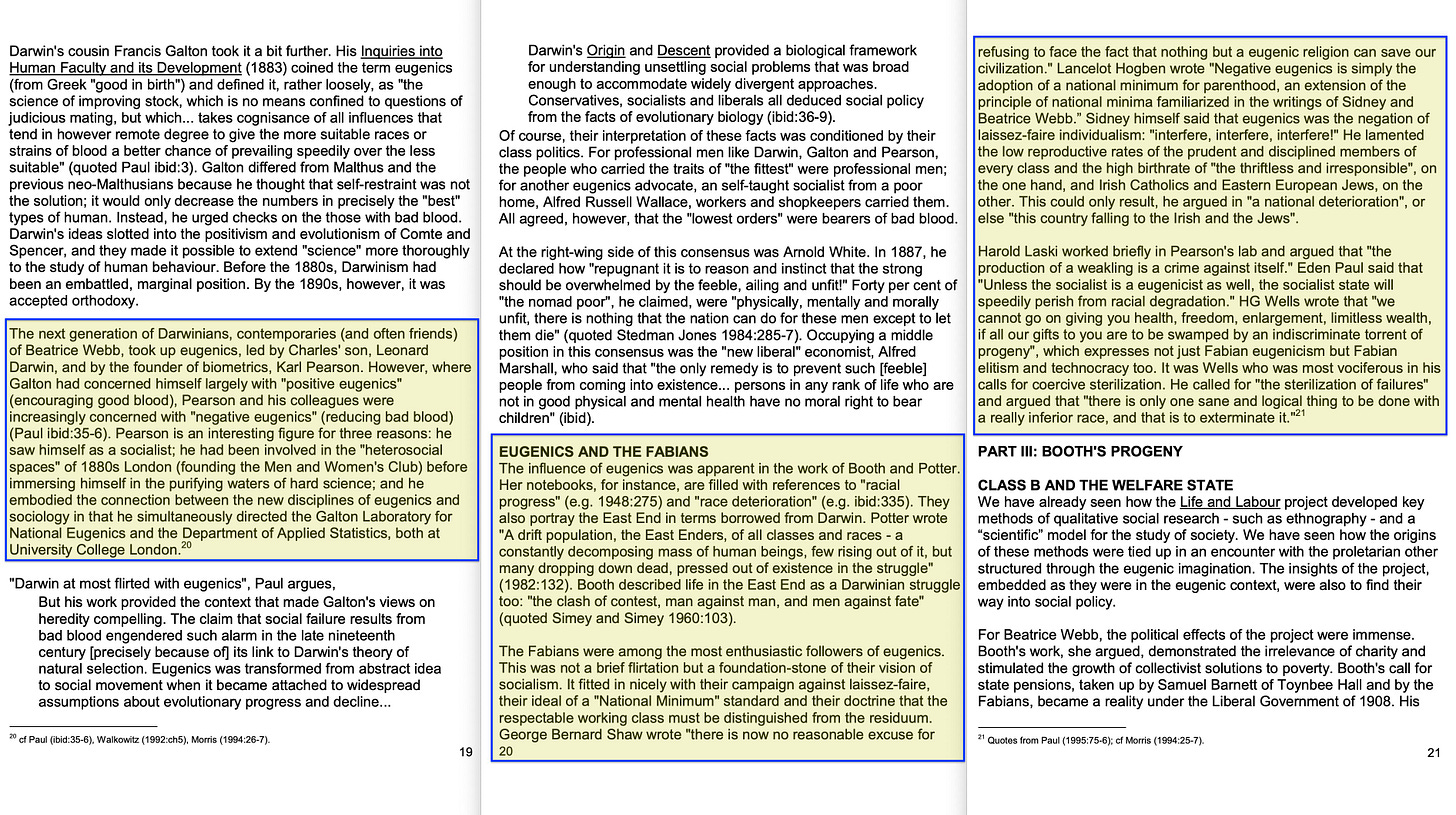







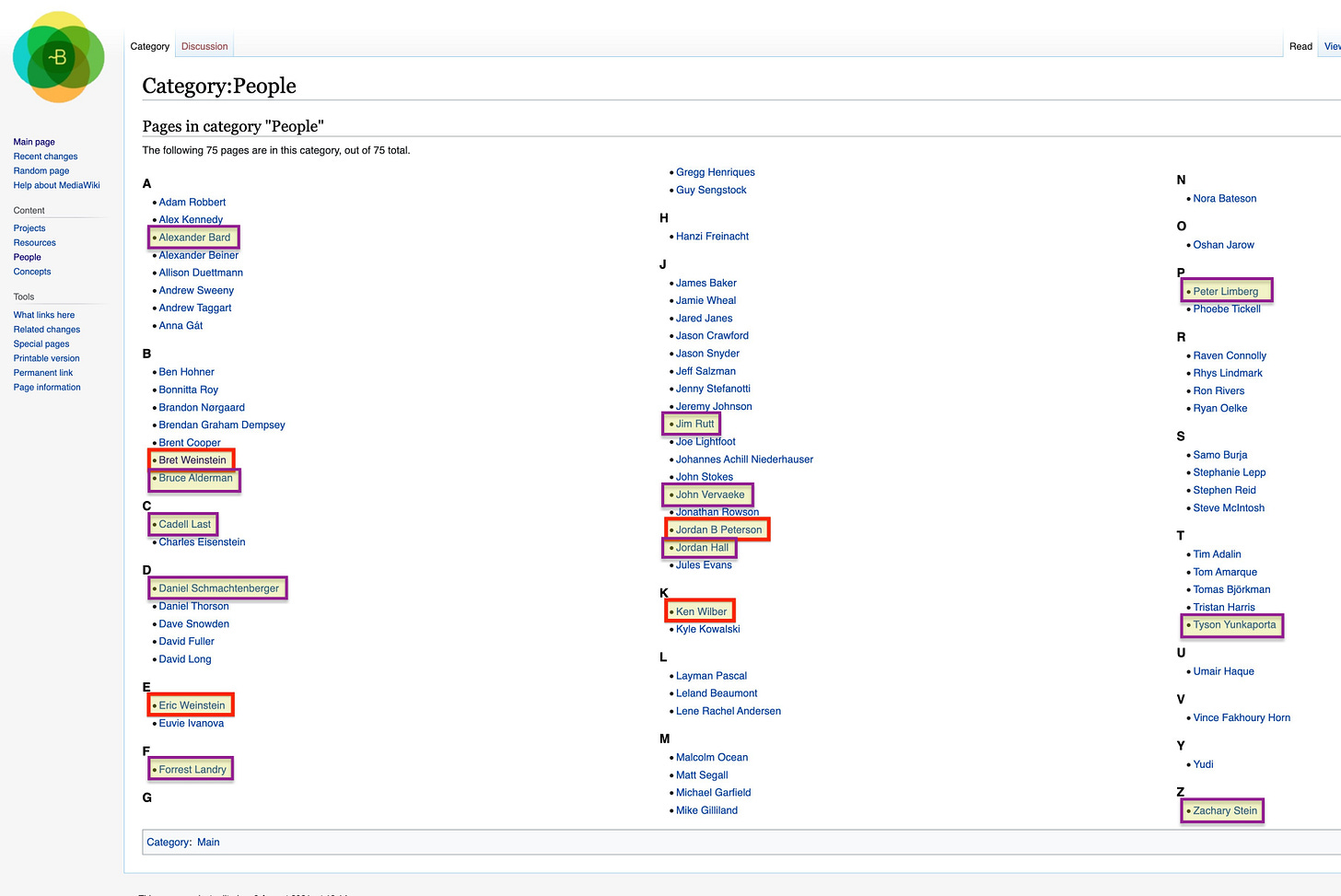
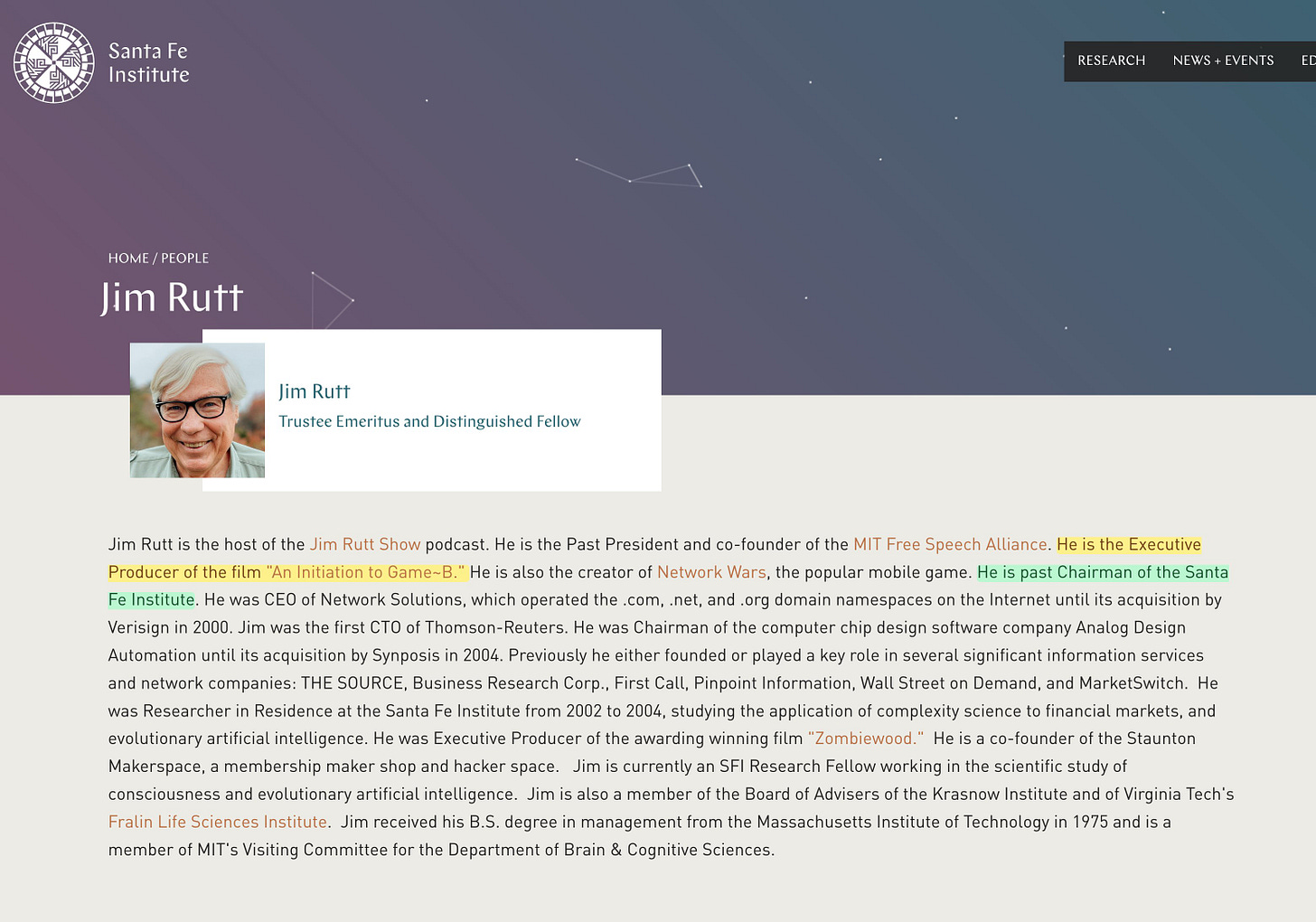




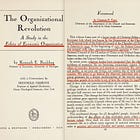















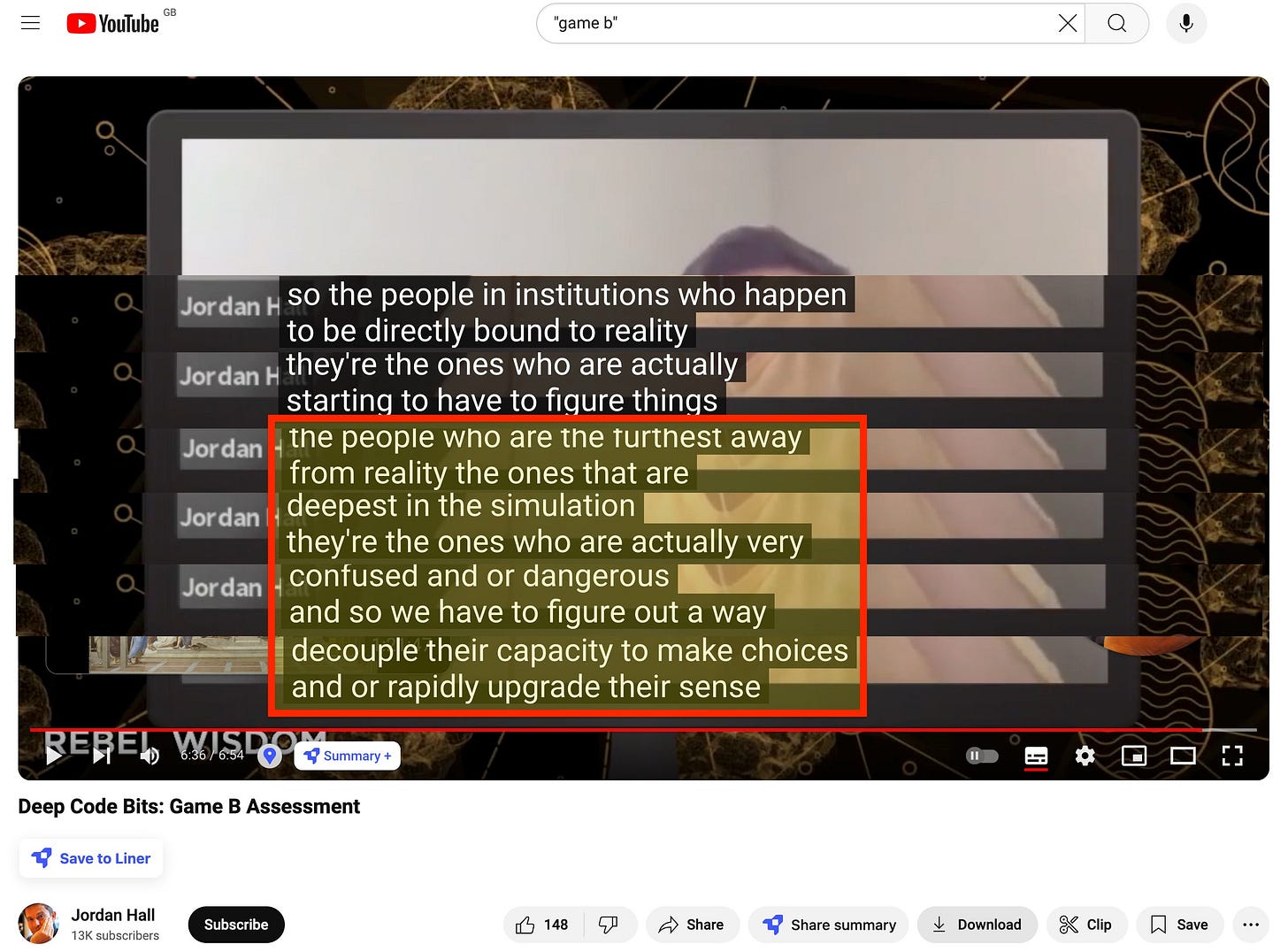









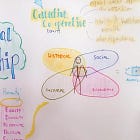
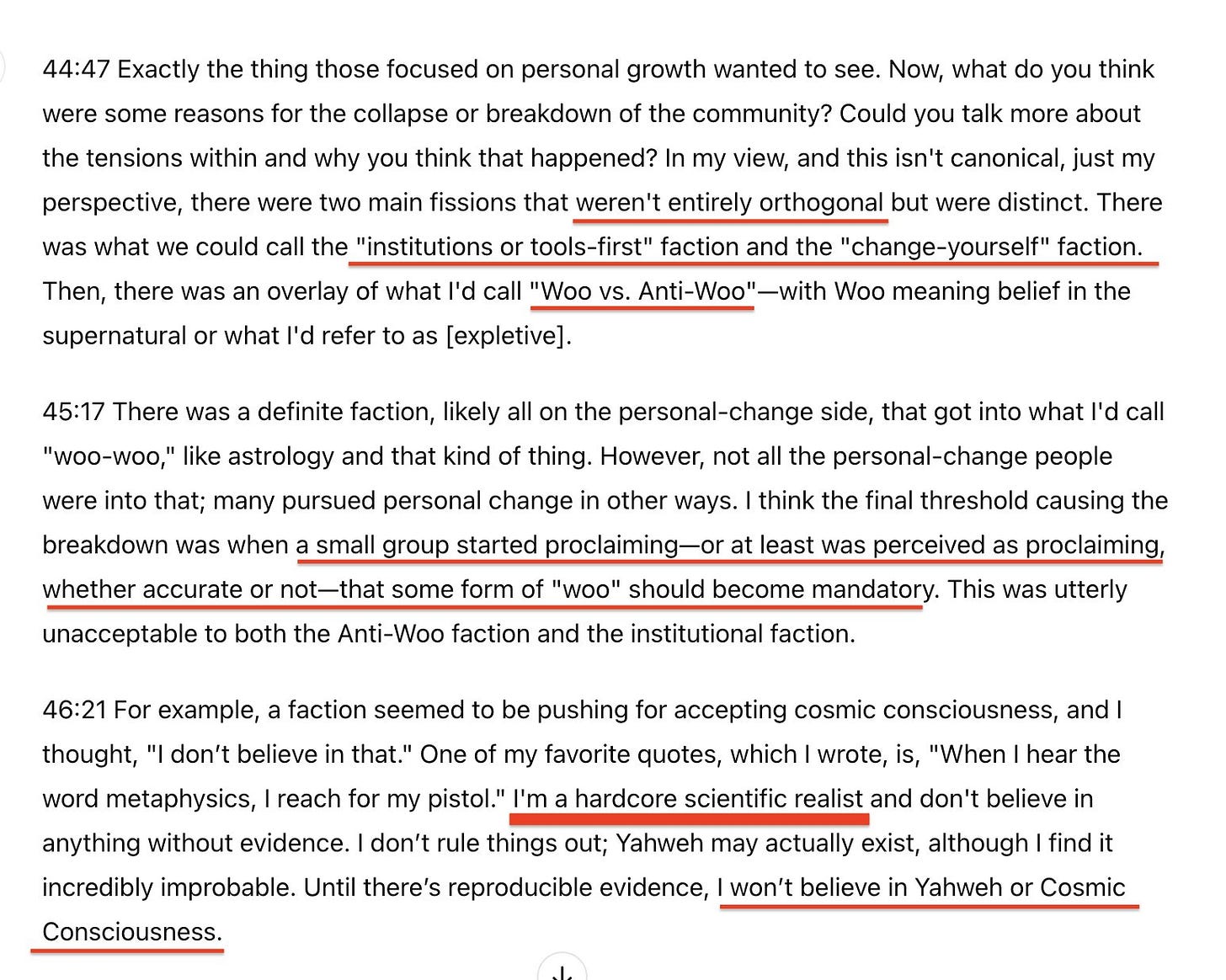
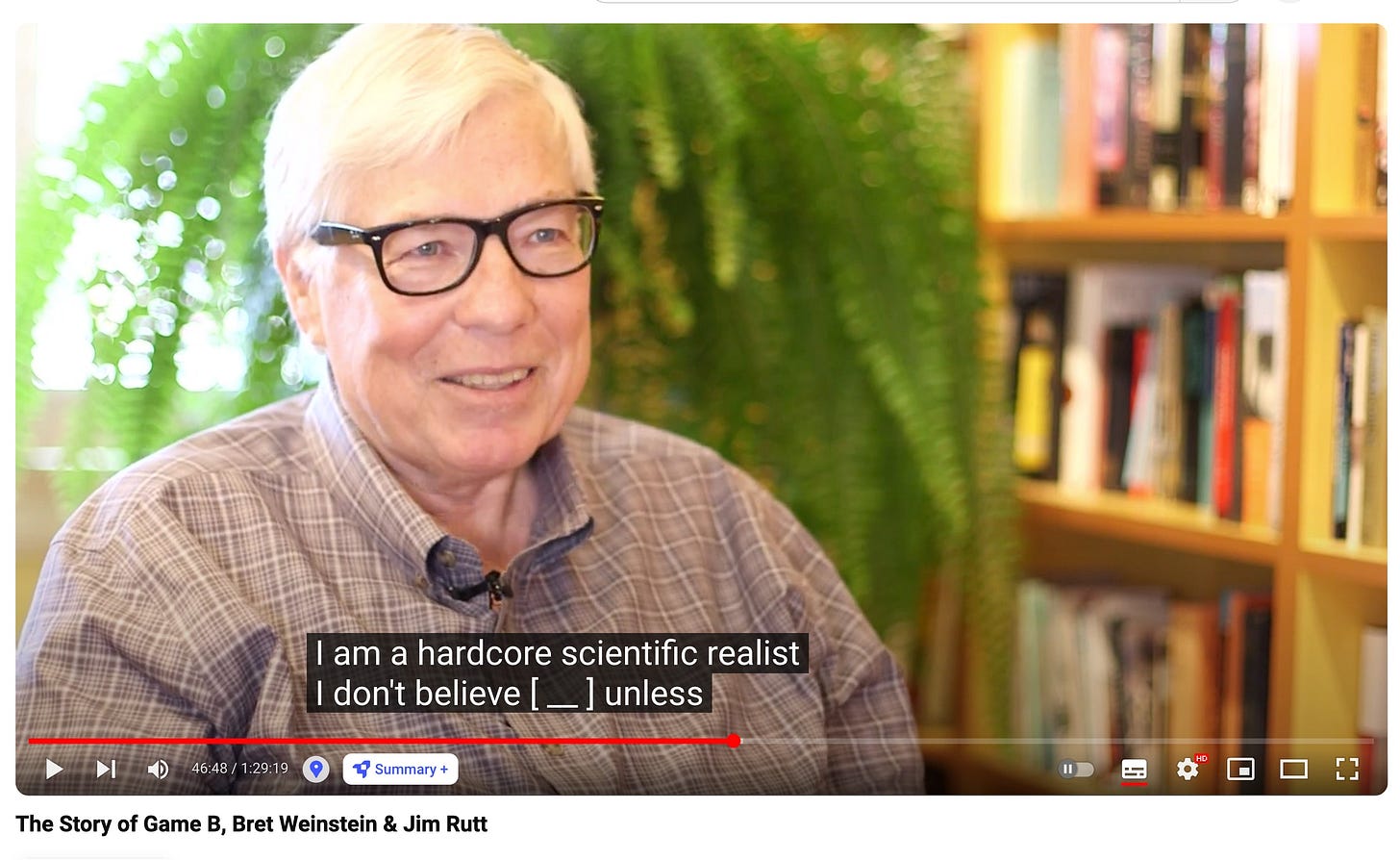
Don't be afraid pissing off the [common] people... ha ha ha.
It is always the same thing. They feel to be the elites and want to legitimze _their_ rule with "Ethics", "sustainability" and so on. But we need direct democracy.
I just watched the movie, pretty freaky